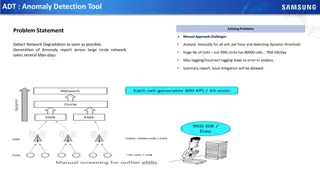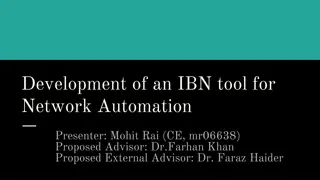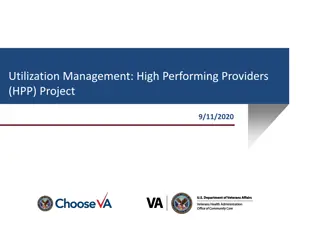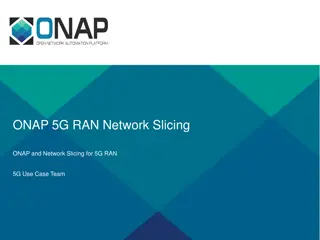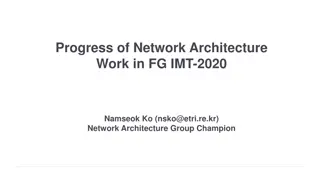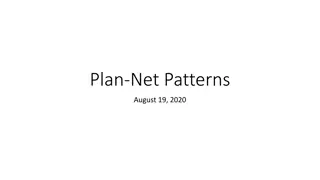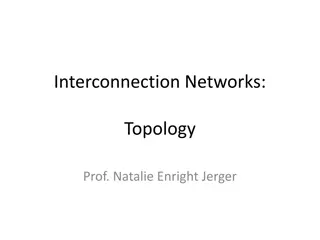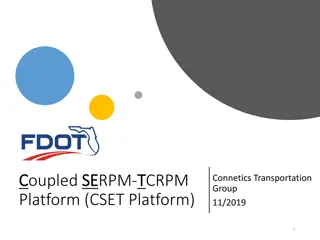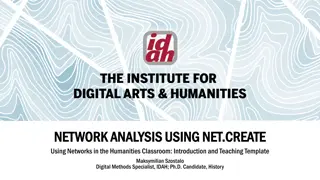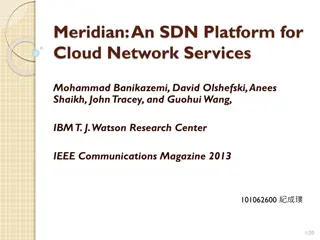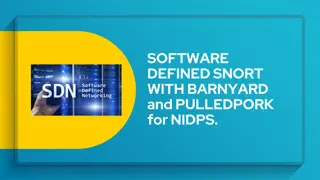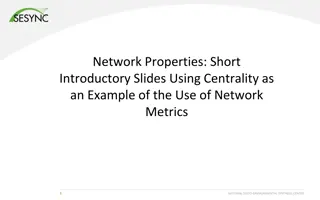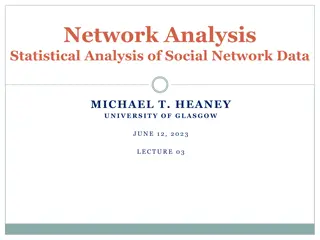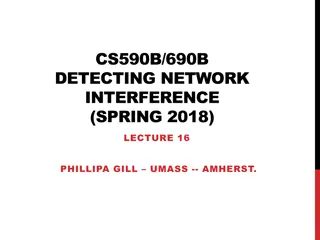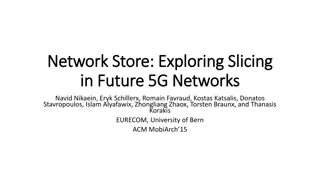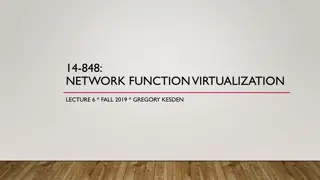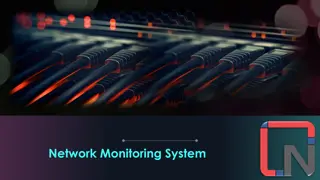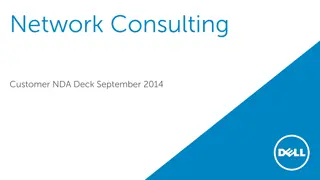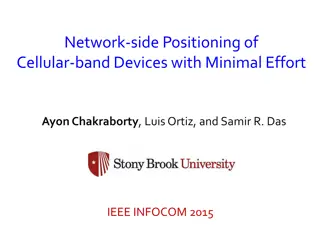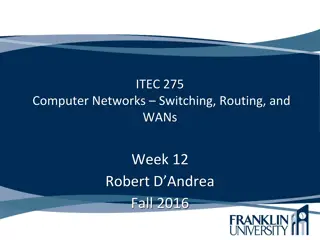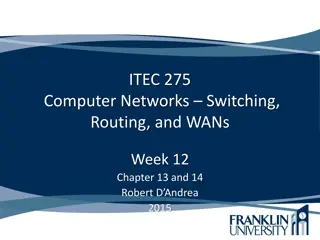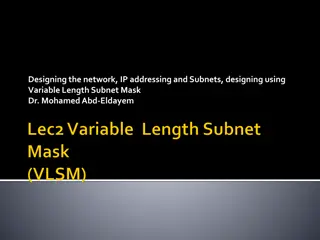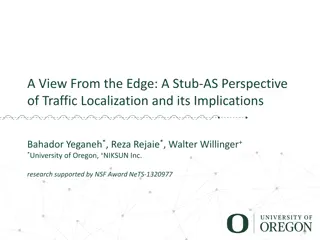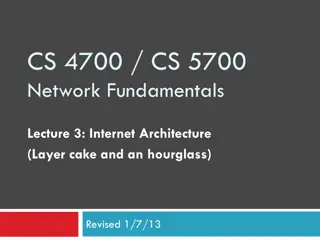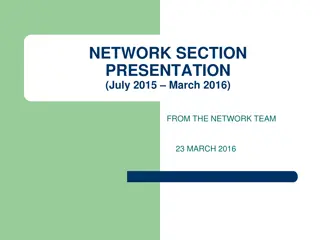Apache MINA: High-performance Network Applications Framework
Apache MINA is a robust framework for building high-performance network applications. With features like non-blocking I/O, event-driven architecture, and enhanced scalability, MINA provides a reliable platform for developing multipurpose infrastructure and networked applications. Its strengths lie i
3 views • 13 slides
Modeling and Generation of Realistic Network Activity Using Non-Negative Matrix Factorization
The GHOST project focuses on the challenges of modeling, analyzing, and generating patterns of network activity. By utilizing Non-Negative Matrix Factorization (NMF), realistic network activity patterns can be created and injected into live wireless networks. Understanding and predicting user behavi
4 views • 28 slides
Automated Anomaly Detection Tool for Network Performance Optimization
Anomaly Detection Tool (ADT) aims to automate the detection of network degradation in a mobile communications network, reducing the time and effort required significantly. By utilizing statistical and machine learning models, ADT can generate anomaly reports efficiently across a large circle network
8 views • 7 slides
Update on CalAIM Claims Payment Transition for ACBH Providers
Providers in Alameda County Behavioral Health Services (ACBH) are required to transition to using CPT codes for billing Medi-Cal due to the implementation of CalAIM. The transition is causing delays in claims payment processing, with ACBH working to align contract amendments with the new billing sys
8 views • 39 slides
Revolutionizing Network Management with Intent-Based Networking
Explore the concept and benefits of Intent-Based Networking (IBN) in simplifying network configuration and enhancing efficiency. Learn how IBN automates network operations, aligns with business objectives, improves security, and ensures scalability and reliability. Discover the potential of IBN tool
0 views • 14 slides
Utilization Management: High Performing Providers (HPP) Project Overview
The Utilization Management (UM) High Performing Providers (HPP) Project aims to identify high-performing community providers within the Community Care Network (CCN) to enhance care coordination and referral processes for Veterans. The project introduces three HPP designations (Y, N, U) based on qual
0 views • 11 slides
Network Compression Techniques: Overview and Practical Issues
Various network compression techniques such as network pruning, knowledge distillation, and parameter quantization are discussed in this content. The importance of pruning redundant weights and neurons in over-parameterized networks is highlighted. Practical issues like weight pruning and neuron pru
0 views • 37 slides
Utilization Management: High Performing Providers (HPP) Project Overview
The High Performing Provider (HPP) project focuses on identifying high-performing community providers for veterans through three designations: Y (Yes), N (No), and U (Unknown). Providers are evaluated based on quality and cost-efficient care criteria, with the goal of enabling efficient referrals, s
1 views • 12 slides
Network Slicing with OAI 5G CN Workshop Overview
Overview of Network Slicing with OAI 5G CN workshop focusing on the crucial role of network slicing in realizing the service-oriented 5G vision. This workshop covers topics like multiple logical networks creation on shared infrastructure, different types of network slices, preparation and instantiat
1 views • 6 slides
Network Design Challenges and Solutions in Business Data Communications
Issues in designing a Local Area Network (LAN) include needs analysis, technological design, and cost assessment. The traditional approach involves structured systems analysis, but faces challenges due to rapidly changing technology and increasing network traffic. The Building Blocks Approach recomm
1 views • 20 slides
Understanding 5G RAN Network Slicing and Architecture
Explore the intricate world of 5G Radio Access Network (RAN) and Network Slicing, delving into concepts such as SO Service Orchestrator, SDN-C Service Design, and Core Network Elements. Discover the significance of managing and designing mobile slice services, including eMBB, Massive IoT, and Missio
0 views • 26 slides
Understanding Snort: An Open-Source Network Intrusion Detection System
Snort is an open-source Network Intrusion Detection System (NIDS) developed by Cisco, capable of analyzing network packets to identify suspicious activities. It can function as a packet sniffer, packet logger, or a full-fledged intrusion prevention system. By monitoring and matching network activity
0 views • 23 slides
Data Flows and Network Challenges in Particle Physics Infrastructure
This overview delves into the data flows and network challenges faced in particle physics infrastructure, focusing on the JUNO project. It discusses the process of data reception, storage, and replication across various data centers, highlighting the bidirectional nature of data flows. Additionally,
0 views • 24 slides
Progress of Network Architecture Work in FG IMT-2020
In the Network Architecture Group led by Namseok Ko, significant progress has been made in defining the IMT-2020 architecture. The work has involved gap analysis, draft recommendations, and setting framework and requirements. Phase 1 focused on identifying 19 architectural gaps, such as demands for
1 views • 11 slides
Support Strategies for Care Providers During the Impact of Covid-19
Samantha Williams, Assistant Director at East Sussex County Council, focuses on strategizing, commissioning, and managing supplies for Adult Social Care and Health. She discusses the challenges faced by care providers during the Covid-19 pandemic, including the need for shielding, PPE services, supp
0 views • 5 slides
Visual Examples of Healthcare Service Providers in Hospital Networks
These visual examples provide a graphical representation of different healthcare service providers in hospital networks, showcasing their affiliations, specialties, and network relationships. The drawings complement the implementation guide examples by illustrating the relationships between instance
0 views • 15 slides
Understanding Interconnection Networks Topology
Exploring the topology of interconnection networks helps determine the arrangement of channels and nodes, impacting network cost, performance, latency, energy consumption, and complexity of implementation. Abstract metrics such as degree, hop count, and network diameter play crucial roles in evaluat
1 views • 56 slides
Transportation Network Modeling and Analysis with C.Coupled SE Platform
This content outlines the features and functionalities of the C.Coupled SE Platform (CSET Platform) developed by the Connetics Transportation Group. It covers aspects such as interface design, inputs merging, purposes, platform development using Cube, TAZs merging, and network attributes. The platfo
0 views • 11 slides
Human Disease Symptom Network: Understanding Disease Relationships Through Symptoms and Genes
The Human Disease Symptom Network (HSDN) is constructed using a large-scale medical bibliographic records database to form a network of human diseases based on symptom similarities. By integrating disease-gene associations and protein-protein interaction data, correlations between symptom similarity
0 views • 37 slides
Introduction to Network Analysis Using .NET
This presentation introduces the concept of network analysis using .NET in the humanities classroom. It provides a template for teaching and adapting network analysis tools for educational purposes. The guide explains the relevance of networks in processing and visualizing data, emphasizing the coll
0 views • 20 slides
Becoming a Child Care Provider for Child Care Assistance Program
To participate in the Child Care Assistance Program (CCAP) in Alaska, child care providers must be approved by the Department of Health and Social Services. The program, known as Parents Achieving Self Sufficiency (PASS), offers assistance with child care expenses on a sliding fee scale for eligible
0 views • 14 slides
Meridian: An SDN Platform for Cloud Network Services
Meridian is an SDN platform developed by Mohammad Banikazemi, David Olshefski, Anees Shaikh, John Tracey, and GuohuiWang at IBM T. J. Watson Research Center. The platform focuses on providing cloud network services efficiently. It encompasses an architecture that enables faster and more convenient n
0 views • 21 slides
Enhancing Network Security with Software-Defined Snort and OpenFlow
Explore the implementation of Snort, Barnyard, and PulledPork within a Software-Defined Network framework using OpenFlow technology. Learn how these tools enhance network security through intrusion detection engines, rule management, and network traffic control mechanisms. Dive into the architecture
0 views • 15 slides
Understanding Network Metrics Through Centrality Analysis
This presentation introduces network metrics as tools to describe network characteristics and answer important questions. Using centrality metrics as an example, participants learn how to identify the most important nodes in a network based on different criteria such as degree centrality and closene
0 views • 15 slides
Comprehensive Student Health Insurance Plan Details
The student health insurance plan offered by the University covers major medical expenses and includes both in-network and out-of-network coverage. Underwritten by United Healthcare, the plan is compliant with the Affordable Care Act and offers a wide network of providers. It comes with additional b
0 views • 21 slides
Understanding Network Analysis: Whole Networks vs. Ego Networks
Explore the differences between Whole Networks and Ego Networks in social network analysis. Whole Networks provide comprehensive information about all nodes and links, enabling the computation of network-level statistics. On the other hand, Ego Networks focus on a sample of nodes, limiting the abili
0 views • 31 slides
Understanding Network Interference in CS590B/690B Lecture
Delve into the realm of network interference through the CS590B/690B lecture with Phillipa Gill at UMass Amherst. Explore topics such as Internet routing, timing attacks, BGP hijacks, Tor network functionality, relay selection, collusion scenarios, use of guards, web site fingerprinting attacks, tra
0 views • 11 slides
Contribution of HALA Network to ATM Community and SESAR 2020: Achievements and Future Directions
HALA network has been instrumental in fostering research and innovation in the field of automation for ATM systems, providing a platform for knowledge dissemination, collaboration, and advancement. The network has facilitated exploratory research, encouraged young scientists' participation, and crea
0 views • 12 slides
Exploring Network Slicing in Future 5G Networks
The research delves into the design of a 5G-ready architecture known as NFV-based Network Store, aiming to serve as a digital distribution platform for 5G applications. By focusing on network slicing and programmability, the architecture enhances resource efficiency and agility in deploying software
0 views • 17 slides
Network Function Virtualization (NFV) Overview
Network Function Virtualization (NFV) focuses on virtualizing network functions to improve efficiency and reduce costs in network infrastructure. The lecture discusses key readings, devices that compose a network, specialization of devices, benefits of one-device-does-anything approach, and the goal
0 views • 21 slides
Enhancing Network Stability with Network Monitoring Systems
Network monitoring is crucial for efficient management and proactive issue detection in a network environment. Factors influencing an effective network system include choosing the best OEM, SLA agreements, and selecting a reliable System Integrator. Reactive monitoring can lead to financial losses a
0 views • 12 slides
Dell Network Consulting Services Overview
Dell Network Consulting provides expert insights and workshops to enhance your network infrastructure's efficiency. Services include network assessments, topology discovery, traffic analysis, and wireless site assessments. Deliverables include detailed reports, remediation plans, and infrastructure
1 views • 5 slides
Cellular Network Positioning Techniques for Location Estimation
Utilizing cellular signal strength information for positioning devices within a network, this study explores network-side positioning methods such as fingerprinting in cellular networks. The research delves into the process of estimating device locations by analyzing received signal strengths from n
0 views • 29 slides
Understanding Network Testing in Modern Computing Environments
Today, network connections are essential for various computing tasks, from accessing the internet to setting up local area networks. This article delves into the importance of evaluating existing networks, testing network performance, and ensuring stable connections for optimal user experience. It d
0 views • 46 slides
Understanding Network Testing for Efficient Connectivity
Today, network connections play a vital role in both home and company environments. Ensuring a stable and fast network connection is essential for optimal performance. Various network testing tools are available, including LAN Speed Test and Internet Speed Tracker Extension, to help assess and impro
1 views • 48 slides
Efficient Network Design with Variable Length Subnet Mask
Variable-Length Subnet Masking (VLSM) offers a more efficient way of subnetting a network compared to classical subnetting. By using different subnet masks for different networks, VLSM allows for a more optimal utilization of IP addresses. This involves determining the number of host bits needed for
0 views • 15 slides
Traffic Localization at the Edge: Implications for User Performance
This paper explores the localization of traffic at the edge network by major content providers, its impact on user performance, and the methodology to measure traffic locality. Using data from the University of Oregon, the study identifies top content providers such as Netflix and Akamai while inves
2 views • 23 slides
Understanding Network Fundamentals: Layered Architecture and Functionality
Explore the concepts of network architecture, layering, and network functionality in this insightful lecture. Discover how different components like Ethernet, Wi-Fi, and applications like Email and Bittorrent work together to form complex networks. Delve into issues such as the nightmare scenario of
0 views • 34 slides
Accelerating Systemic Change Network Inaugural Workshop Summary
The Accelerating Systemic Change Network held its inaugural workshop at Howard Hughes Medical Institute in July 2016 to address the lack of coordination in improving higher education. With a vision to become a professional hub for change researchers in STEM education, the network aims to enhance ind
0 views • 5 slides
University Network Section Overview July 2015 - March 2016
The presentation covers the network team structure, team members, objectives, goals, report outline, network statistics, accomplishments, and future plans of the university network section from July 2015 to March 2016. It highlights efforts to provide stable internet and intranet services, restructu
0 views • 16 slides


